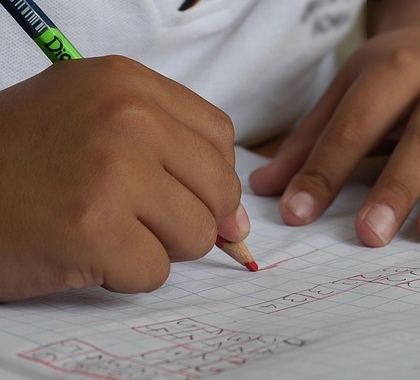‘Experience-Based’ Learning
Caroline Makepeace, a former teacher who instructs her two elementary school-aged daughters while traveling, says she makes use of traditional teaching methods while they’re on the road.
“[Road schooling] is a word families have chosen to use who are homeschooling as they’re traveling,” Makepeace said. “It’s probably a little more flexible than homeschooling, and a lot of the lessons, etc. are experienced-based and are related to the different travel experiences we’re having. I also incorporate sit-down work every day to really focus on that skill-based learning: math, reading, spelling, writing, those really, really important foundational skills.”
Started with Distance Education
Makepeace and her husband started a form of road schooling in 2013 when they traveled around Australia. The family’s method of learning has evolved since then.
“What I did then was called ‘distance education,’ and it’s a lot more structured than road-schooling,” Makepeace said. “I think it’s something we only have in Australia, where it was designed originally for children in the Outback who couldn’t get to a school because schools were too far away. They have a teacher who can teach them over the radio. Australian children who are traveling either around the country or internationally can register in a school. They have a teacher, they have a class, and the teacher sends out units of work and lessons.”
‘It’s a Lifestyle Decision’
Makepeace says she decided a more flexible way of educating her children works better for their lifestyle.
“I decided, coming over to the U.S., based on the experience of traveling around Australia and doing distance education, to do this road schooling format,” Makepeace said. “We’ve been doing that with the girls now for about a year. It’s a lifestyle decision. I’ve been traveling since 1997, so it is my lifestyle, and I knew that I would continue to do that with the children. We have a business now that’s around travel as well, and we’re obviously traveling all the time, so it was just too difficult for us to manage that with the girls in traditional school, so the road schooling really works with our lifestyle.”
‘Fantastic Way’ to Learn
Makepeace says her girls benefit from experiences not found in traditional schools.
“It’s a fantastic way for children to learn,” Makepeace said. “They learn so much about the world around them, and they learn so much about themselves. They get to develop a lot of [abilities] that I think a lot of schools don’t do a really good job of teaching, [such as] how to make decisions, how to be independent, how to be responsible, confident, courageous. All those things, I think, travel really gives to my children, so I love that that’s a huge part of their day-to-day life.”
Hands-On Learning
The Makepeace family incorporates hands-on experiences such as visits to museums, art galleries, and national parks into their learning experience. They recently visited Hawaii Volcano National Park, where the girls learned about volcanoes, earthquakes, and rainforests while walking among lava fields. Makepeace says her daughters learn especially well through such activities.
“That’s just something they completely grasped and will remember forever,” Makepeace said.
The Makepeaces just returned from a journey to Tennessee, where they learned about music and culture, Makepeace says.
“It was a fabulous learning experience for [the girls] musically,” Makepeace said. “Tennessee has a great musical history and so many different forms of music, which we experienced at the Grand Ole Opry and down in Memphis. We went to a blues café and visited the Civil Rights Museum in Memphis, which the girls really, really enjoyed.”
Outdoor Living
Fresh air and exercise are also a big aspect of road schooling for the girls, Makepeace says.
“We’re very big on outdoor living, so we really take those experiences out when we travel, and they know the huge importance of exercise and good health and physical education, and my girls are getting that all the time,” Makepeace said. “They’re getting to learn, from a physical education standpoint, activities that they’re very interested in and want to do, such as rock climbing. We’ve become really big fans of stand-up paddle boarding, which is a wonderful family activity.”
‘Flexibility Really Is Key’
Makepeace says she has learned to accept the unpredictability of road schooling and that it’s important to make learning experiences happen everywhere.
“Flexibility really is key,” Makepeace said. “One day you might be out exploring all day, and so that skill-based work might not be something you have time to do. Just accepting that that’s OK and letting that go and understanding that when you’re out exploring, they’re learning and gaining so much from that alone.”
Traveling around Australia and doing distance learning, Makepeace says she felt the pressure of “having those boxes to check.”
“I didn’t want to do that this time, because I found it a little too stressful, and the more I’ve done this, the more I’ve realized with this lifestyle that we’ve chosen, our children are really fantastic at taking care of their own learning and their own growth,” Makepeace said. “It’s really now just a matter of me making sure they’re engaging with every experience we have, and they’re learning something from it. You can easily do that through conversation and being present with them doing that, and then just having that time to be able to do that schoolwork.”
The Makepeace family blogs about their road schooling adventures at https://www.ytravelblog.com/.
Teresa Mull ([email protected]) is a research fellow in education policy at The Heartland Institute.





